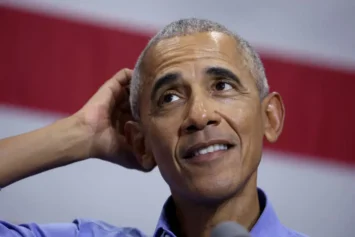As the move to legalize marijuana gathers steam across the nation, with Colorado and Washington already taking the plunge and five other states slated to put the question on the ballot this year, President Obama weighed in on the debate in a New Yorker interview, saying he was disturbed by the disproportionate impact of arrests on Blacks and Hispanics.
A massive presidential profile by author David Remnick covers a wide range of topics, but Remnick’s questions about marijuana have been generating the most headlines—even though Remnick said Obama’s responses on marijuana were an example of the president coyly avoiding making news on the issue.
“As has been well documented, I smoked pot as a kid, and I view it as a bad habit and a vice, not very different from the cigarettes that I smoked as a young person up through a big chunk of my adult life. I don’t think it is more dangerous than alcohol,” Obama said in the New Yorker.
When Remnick asked if marijuana is less dangerous, he said Obama paused for a long moment.
“When he is interviewed, particularly for print, he has the habit of slowing himself down, and the result is a spool of cautious lucidity,” Remnick writes about the president. “He speaks in paragraphs and with moments of revision. Sometimes he will stop in the middle of a sentence and say, ‘Scratch that,’ or, ‘I think the grammar was all screwed up in that sentence, so let me start again.'”
The president continued by saying, less dangerous “in terms of its impact on the individual consumer. It’s not something I encourage, and I’ve told my daughters I think it’s a bad idea, a waste of time, not very healthy.”
Obama said what clearly does trouble him is the radically disproportionate arrests and incarcerations for marijuana among minorities.
“Middle-class kids don’t get locked up for smoking pot, and poor kids do,” he said. “And African-American kids and Latino kids are more likely to be poor and less likely to have the resources and the support to avoid unduly harsh penalties.”
“We should not be locking up kids or individual users for long stretches of jail time when some of the folks who are writing those laws have probably done the same thing,” he said.
As for the legalization movement, he said, “it’s important for it to go forward because it’s important for society not to have a situation in which a large portion of people have at one time or another broken the law and only a select few get punished.”
But then he concluded with, “Having said all that, those who argue that legalizing marijuana is a panacea and it solves all these social problems, I think are probably overstating the case. There is a lot of hair on that policy. And the experiment that’s going to be taking place in Colorado and Washington is going to be, I think, a challenge.”
“I also think that, when it comes to harder drugs, the harm done to the user is profound and the social costs are profound. And you do start getting into some difficult line-drawing issues. If marijuana is fully legalized and at some point folks say, Well, we can come up with a negotiated dose of cocaine that we can show is not any more harmful than vodka, are we open to that? If somebody says, We’ve got a finely calibrated dose of meth, it isn’t going to kill you or rot your teeth, are we OK with that?”


